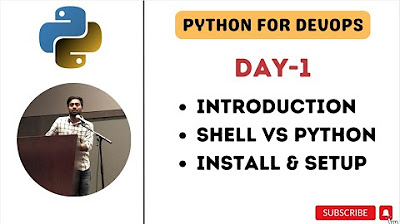Is DevOps The Right Career Option To Choose In 2024? | Career Growth In DevOps | Simplilearn
Summary
TLDRThis video from Simply Learn explains why DevOps is a great career choice. It covers the basics of DevOps, which combines software development and IT operations to enhance collaboration and improve software quality. The video highlights high demand, versatility, broad skill sets, and job satisfaction as reasons to pursue a career in DevOps. It also outlines career paths, from junior DevOps engineers to leadership roles, while emphasizing continuous learning and certifications. Additionally, it touches on salary potential and growth opportunities in cloud computing, cybersecurity, and AI.
Takeaways
- 🚀 DevOps bridges the gap between development and IT operations, aiming to provide faster, more reliable software updates.
- 👨💻 DevOps fosters collaboration between teams, breaking down the old barriers between developers and operations for smoother processes.
- 💼 DevOps roles are in high demand due to the increasing need for efficient tech solutions in a fast-paced environment.
- 🛠️ DevOps professionals gain versatile skills, from coding and scripting to infrastructure management and security.
- 📈 A career in DevOps offers broad opportunities in automation, cloud computing, containerization, and cybersecurity.
- 💡 Continuous learning is crucial, as DevOps is an ever-evolving field where staying updated with tools and practices is key.
- 🏆 Career paths in DevOps can progress from Junior DevOps Engineer to Senior and Lead positions, with opportunities in management or consulting.
- 💰 DevOps professionals are well-compensated, with average salaries in the U.S. ranging from $110,000 to $150,000 per year depending on experience.
- 🔧 Familiarity with tools like Jenkins, Docker, Kubernetes, and infrastructure-as-code tools such as Terraform are essential for success in DevOps.
- 🌍 DevOps skills are becoming critical across sectors like finance, healthcare, and government, not just traditional tech industries.
Q & A
What is DevOps and why is it important?
-DevOps is a set of practices that combines software development (Dev) and IT operations (Ops) to shorten the software development lifecycle while delivering high-quality software continuously. It's important because it fosters collaboration between teams, ensuring smoother, faster, and more reliable updates.
How does DevOps address the issue of bugs and downtime in software updates?
-DevOps aims to reduce bugs and downtime by integrating development and operations teams. This collaboration ensures that updates are more thoroughly tested and efficiently deployed, minimizing the risk of issues during updates.
What are the main reasons to pursue a career in DevOps?
-Key reasons to pursue a career in DevOps include high demand for DevOps professionals, versatility in job roles, the development of a broad skill set, opportunities for innovation, and high job satisfaction due to the dynamic nature of the work.
What skills are important for a career in DevOps?
-Crucial skills for a DevOps career include programming (e.g., Python, Ruby), scripting, knowledge of automation tools, cloud computing, containerization, continuous integration/continuous deployment (CI/CD) pipelines, and infrastructure as code tools like Terraform.
What are the different career paths available in DevOps?
-A typical career path in DevOps starts with a Junior DevOps Engineer, progressing to DevOps Engineer, Senior DevOps Engineer, and eventually to Lead DevOps Engineer or DevOps Manager. The path involves increasing responsibilities in automation, deployment, and team management.
How does a background in systems administration help in transitioning to DevOps?
-Systems administrators have a strong foundation in managing IT infrastructure, which is crucial for automating infrastructure management in DevOps. Learning automation tools like Ansible and CI/CD pipelines helps them transition smoothly into DevOps roles.
What role does automation play in DevOps?
-Automation is a core component of DevOps. It streamlines repetitive tasks, such as testing, deploying updates, and managing infrastructure. Automation tools like Jenkins, Chef, and Puppet are widely used to ensure continuous integration and smooth deployments.
What is the salary potential for DevOps professionals?
-According to Glassdoor, the average salary for a DevOps Engineer in the U.S. is around $117,000 per year, with experienced professionals earning up to $150,000 or more, depending on location, company size, and experience level.
How does DevOps create growth opportunities across various industries?
-DevOps professionals are in high demand across sectors like finance, healthcare, and government agencies. Additionally, DevOps allows specialization in areas like cloud computing, cybersecurity, and AI, providing diverse opportunities for career growth.
What role does continuous learning play in a DevOps career?
-Continuous learning is vital in DevOps due to the field's fast-paced and evolving nature. Staying updated with the latest tools, technologies, and certifications is essential to remain competitive and grow in a DevOps career.
Outlines

This section is available to paid users only. Please upgrade to access this part.
Upgrade NowMindmap

This section is available to paid users only. Please upgrade to access this part.
Upgrade NowKeywords

This section is available to paid users only. Please upgrade to access this part.
Upgrade NowHighlights

This section is available to paid users only. Please upgrade to access this part.
Upgrade NowTranscripts

This section is available to paid users only. Please upgrade to access this part.
Upgrade NowBrowse More Related Video

Scrum Explained Under 20 Mins | What Is Scrum? | Scrum Master Training Tutorial | Simplilearn

HOW TO BE A MEDIA BUYER // Make 6-Figures Advertising on Facebook, Google, Snapchat, & TikTok

How I would Become a DevOps Engineer (If I was a Beginner) in 2025

Day-1 | Introduction to Python | Shell Scripting vs Python | Install and Run | #abhishekveeramalla

Use Matcha Tea As Coffee Alternative – Dr. Berg

Memahami Profesi Keperawatan, Jenjang Karir Perawat dan Alasan Memilih Profesi Perawat
5.0 / 5 (0 votes)